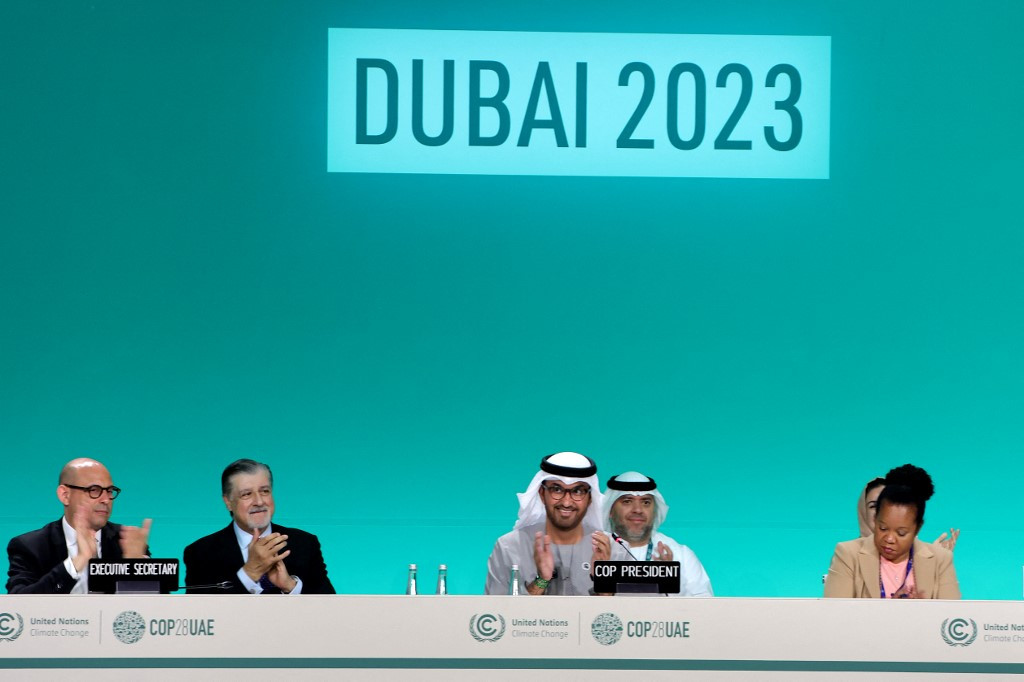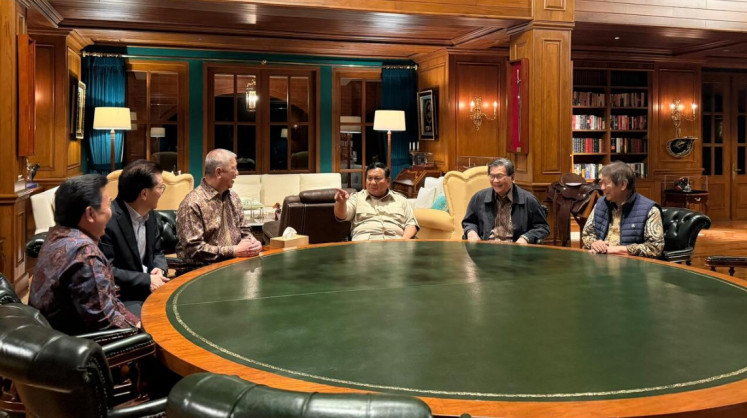Popular Reads
Top Results
Can't find what you're looking for?
View all search resultsPopular Reads
Top Results
Can't find what you're looking for?
View all search resultsCOP28, where is the dough?
Developed countries have been the main source of the carbon emissions present in our atmosphere today, produced from the fossil fuels they burn to maintain their economies and lifestyles.
Change text size
Gift Premium Articles
to Anyone
 COP28 president Sultan Ahmed Al Jaber (center) and United Nations Framework Convention on Climate Change (UNFCCC) Executive Secretary Simon Stiell (left) applaud on Dec. 13, 2023, alongside other officials at a plenary session during the United Nations climate summit in Dubai, the United Arab Emirates. (AFP/Guiseppe Cacace)
COP28 president Sultan Ahmed Al Jaber (center) and United Nations Framework Convention on Climate Change (UNFCCC) Executive Secretary Simon Stiell (left) applaud on Dec. 13, 2023, alongside other officials at a plenary session during the United Nations climate summit in Dubai, the United Arab Emirates. (AFP/Guiseppe Cacace)
A
transition away from fossil fuels seems as good as a commitment as you can expect from the 198 countries taking part in the United Nations climate conference which wrapped up in Dubai on Wednesday. Negotiations went into overtime because of objections from oil-producing countries in the Organization of Petroleum Exporting Countries (OPEC) to the wording “phasing out”, which many other countries had demanded be included in the declaration.
The compromise may not satisfy many countries that wanted to see a stronger commitment to ending the use of fossil fuels – primarily coal, oil and gas – with a clear timeline, but we have to recognize that this is the first time that the Conference of Parties (COP) has formally put in writing the need to ditch dirty energy in favor of clean and renewable alternatives. It was a historic moment, and the credit goes to the United Arab Emirates, the host and president of COP28.
The focus on eliminating fossil fuels in the last days of the two-week conference eclipsed an equally important component in this transition that remains unresolved. How are nations going to pay for the huge costs of making the switch from fossil fuels to renewables?
There is already an agreement on the creation of the loss and damage fund to help developing countries make the transition, but we have not seen clear commitments from developed countries regarding how much and how soon they are willing to contribute.
Developed countries have been the main source of the carbon emissions present in our atmosphere today, produced from the fossil fuels they burn to maintain their economies and lifestyles. It is only natural that they help developing countries finance the transition to renewable energy.
At COP conferences, including the latest one Dubai, these countries have taken the mantle of climate change champions, pushing for earlier phaseouts of coal, oil and gas, and faster development of renewable energy. This makes good optics for folks back home. But if they do not put their money where their mouth is, they look more like a bunch of hypocrites in the eyes of the developing world.
What the world needs in the face of the climate crisis is leadership, and this is not forthcoming from those champion wannabes who are able to lead by virtue of their economic size. Instead, they are quick to find scapegoats for any delays.
In Dubai, they blamed OPEC for holding back the agreement. Some of these countries are themselves large oil producers and would benefit from the delays. And their oil and gas companies, which dominate the global industry, are quietly benefiting. That makes the hypocrisy even more extreme.
At COP21 in Paris in 2015, nations made the bold commitment to keep the rise in global temperatures to an average of the preindustrial level of 1.5 degrees Celsius. They hoped to achieve this through mitigation, adaptation and finance.
Subsequent COPs have struggled to address all three, and the third component is the real holdback. We cannot have the first two without the financial support.
Earth cannot afford the slow progress that the COP series has been making in mitigating climate change since Paris. Climate scientists say 1.5 degrees is the tipping point beyond which the climate will see irreversible catastrophic changes, from melting ice sheets and glaciers to accelerating extinctions, groundwater depletion, space debris and unbearable heat.
Indonesia as the largest archipelagic nation in the world, counts among the most vulnerable to climate change, along with other island nations. We will be the first to drown with the ever-rising sea level. Already the constant flooding we see in many parts of the country are warnings that global warming is coming. We too need to do our part in transitioning from fossil fuels to renewables, with or without foreign funding.
Eight years after the Paris meeting, we are almost sure to miss the target. And even if we want to mitigate global warming at a slower pace, we need huge funding. At least we know who to blame.










